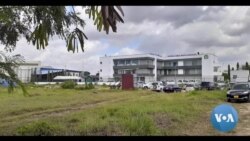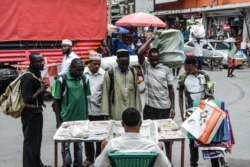The lady at the National Public Health Laboratory answered my question as she handed me the certificate from my COVID-19 test: “You tested negative, so you don’t have to know what happens if you test positive.”
Her remark was not entirely reassuring, but it was a relief to know I was not infected and would finally be able to travel home to Kenya and see my girlfriend. I had spent the past five months in Tanzania, stranded comfortably at my friends’ Mikadi Beach Camp in Dar es Salaam.
The testing center is in an industrial outskirt of Dar es Salaam, and people were flocking to get their swabs taken. There were many foreigners, including busloads of Chinese tourists coming to be tested.
Masks are compulsory inside the sterile-looking building, where a large photograph of President John Magufuli looms over test applicants from behind the registration counter.
In June, Magufuli announced that Tanzania had become the first country in the world to vanquish the coronavirus. "The corona disease has been eliminated thanks to God," he had said. National testing stopped weeks earlier, on April 29th, with the official tally halted at 509 cases and 21 deaths.
It adds to a sense of weirdness that marked my months in Tanzania. My friends reopened the beach lodge where I was staying after months of closure because of the jolly atmosphere after Tanzania proclaimed that the virus was gone.
We had clients who came to have a swim, enjoy a birthday or sleep in one of the beach huts. Sometimes I would stare at the cheerful-looking clients, wondering whether one of them was carrying the coronavirus and whether I would have to keep my distance.
We did none of that. We joined in celebrations, having good time with seafood barbecues and South African stew pots. We somehow kept distance by going on boat trips to nearby Sinda Island to map the coral reefs for conservational purposes and eco-tourism.
Altogether we created an environment where the coronavirus was a remote threat. We went to nightclubs and had great time. We went to a VIP room filled with people where we danced until the sweat came out.
On the way back to the beach lodge from the testing center with a negative certificate, I wondered how I could have avoided becoming infected in those nightclubs. Could Tanzania really be free of the virus? In any case my test result was a relief to my friends in the lodge, since we would likely have all become infected together.
The certificate opened the door to finally go home to my girlfriend in Nairobi. The resumption of Kenya’s international air traffic made it a reality.
Feeling sad to leave yet happy to go, we threw a goodbye party with a giant pizza barbecue on the beach. The next day I checked in at the airport after having registered on a self-quarantine app established by Kenya’s Ministry of Health.
My certificate was stamped by port authorities and up the escalator to the gates I went. That proved to be an ascent into another world, where I suddenly found myself surrounded by COVID-19 prevention measures.
All the travelers and airport personnel were face-masked and every other seat in the waiting area was taped to enforce social distancing. There were soap dispensers everywhere, even on the tables of the coffee shop where I waited to board my flight.
The flight to Nairobi was smooth, but as soon as I landed, it started. Being approved for self-quarantine was easy with the Ministry of Health app. My temperature was taken with a gun and I had to declare whether I had fever, cough or shortness of breath. I did not.
I quickly found a taxi driver to take me home. But as soon as we cleared the gate of the airport, I realized there was no other traffic on the roads.
“That’s because of the curfew, sir,” said the driver. “We are exempted because of coming from the airport.”
Roaming though a dark and deserted Nairobi, I started wondering where I had ended up. This was not the buzzing metropolis that I had left months ago.
The reunification with my girlfriend was wonderful and we were so happy at 4 am in the morning, having missed each other for so long. It’s amazing how months of separation can disappear at once, like it never happened.
The wake-up call came the next morning with an SMS alert from the Ministry of Health saying that it was time to file my health details in the self-quarantine app. So I did, but I was a bit amazed.
Kenya seemed to be serious, a realization that was driven home when I went out shopping -- which is allowed under the self-quarantine rules.
Out in public in Dar es Salaam, I would often be the only one wearing a facemask, and occasionally someone would tell me the mask was unnecessary because Tanzania does not have the virus. But here in Kenya, everyone is wearing one; there are no smiles to be seen on Nairobi’s streets.
My familiar shopping mall has been converted into one big hand-washing zone with soap dispensers every 20 meters. The floor is speckled with footstep stickers indicating social distancing space, and shoppers keep to them.
Temperature guns are pointed at your forehead every 20 meters, and the trollies in the supermarket are sprayed before they are rolled into the pathways. There are glass dividers set up at cashiers’ stations to protect the staff from infection. The use of cash money is prohibited in most establishments, requiring shoppers to use digital alternatives.
The tables in my usual coffee shop are sprayed before patrons sit down, and only two people are permitted at each table for four. The waiters wear face masks and helmets. The menus have disappeared to prevent infection; instead there are stickers with QR codes on the tables permitting customers to download the menus onto their smartphones.
Then of course there is the curfew, and the closure of bars and restaurants.
Now I realize how isolated from COVID-19 I had been in Tanzania, on the beach in a country where the virus is officially not there. Now I realize the impact of the pandemic on daily lives around the world.
This is the world my girlfriend has been living in, as have the citizens of another 187 countries. It’s hard for my girlfriend to explain how she coped with it, but the months just went by, she said.
We are happy to be together now in a country where at least the virus is acknowledged, and we are reminded to stay vigilant.
What really happened in Tanzania we will hopefully find out after the pandemic is over. But I miss my friends on the beach a lot. The alerts for my health check will continue for 14 days.








